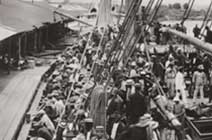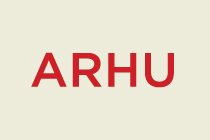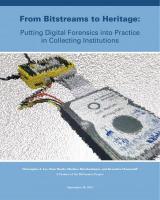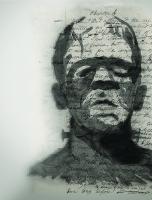COLLEGE PARK, Md. – A $1.25 million grant from the Andrew W. Mellon Foundation will fund research, education and training at the intersections of digital humanities and African American studies at the University of Maryland in an effort to prepare a diverse community of scholars and students whose work will both broaden the reach of the digital humanities in African American history and cultural studies and enrich humanities research with new methods, archives and tools.
The grant, Synergies among Digital Humanities and African American History and Culture: An integrated research and training model, awarded to the College of Arts and Humanities (ARHU) and co-directed by the Arts and Humanities Center for Synergy (Center for Synergy) and the Maryland Institute for Technology in the Humanities (MITH), will support a faculty project director, postdoctoral fellows, graduate students and staff in ARHU and the University Libraries. It also includes money to run workshops, to deliver public programming, to digitize materials from significant archival collections, to support faculty research and to integrate digital work into a number of innovative undergraduate curricular initiatives including UMD’s First-Year Innovation & Research Experience (FIRE) program, a new initiative to expose first-year undergraduates to rich research experiences, mentorship and social activities that are known to impact academic success.
“Maryland’s project enhances the role of digital tools in African American studies as well as the contributions of the field to digital discourse while also making a commitment to widening the reach of the digital humanities both within academic communities and outside the walls of the university,” said Mariët Westermann, vice president of the Andrew W. Mellon Foundation.
The College of Arts and Humanities has made serious investments in digital humanities and African American culture and history, hiring faculty clusters in both digital humanities and African American literature and history, adding to the strong community of digital humanist and African Americanist scholars already spread across the campus’s many colleges.
“This venture could not be more timely or important,” said University of Maryland President Wallace D. Loh. “It builds on our vital strengths in the humanities, increasing access to important source material on race and culture in America, while creating a new generation of technology-savvy researchers.”
 The thematic focus of the project, African American labor, migration and artistic expression, incorporates the broad intellectual interests shared by a large group of prominent scholars, students and staff on campus, and represents some of the campus’s greatest strengths. Specific research projects will be undertaken in collaboration with The Center for the History of the New America, which houses the Archive of Immigrant Voices; The David C. Driskell Center for the Study of Visual Art and Culture of African Americans and the African Diaspora with its collection of over 50,000 objects that chronicle the development and understanding of the study of African American visual culture; and the UMD libraries’ recently acquired George Meany Memorial AFL-CIO Archive, a preeminent research collection for the study of American labor history.
The thematic focus of the project, African American labor, migration and artistic expression, incorporates the broad intellectual interests shared by a large group of prominent scholars, students and staff on campus, and represents some of the campus’s greatest strengths. Specific research projects will be undertaken in collaboration with The Center for the History of the New America, which houses the Archive of Immigrant Voices; The David C. Driskell Center for the Study of Visual Art and Culture of African Americans and the African Diaspora with its collection of over 50,000 objects that chronicle the development and understanding of the study of African American visual culture; and the UMD libraries’ recently acquired George Meany Memorial AFL-CIO Archive, a preeminent research collection for the study of American labor history.
At Maryland, digital humanities as a recognized field can be traced back to the founding of MITH in 1999, which has grown to international acclaim due to its transformational research at the intersection of technology and humanistic inquiry. The project will apply MITH’s innovative digital humanities incubator model to introduce scholars, students and cultural heritage professionals to new modes of research through a series of workshops, tutorials and detailed consultations. Strong in traditional arts and humanities fields as well, the university is also home to the Center for Synergy, the new humanities center at Maryland, which will provide an interdisciplinary bridge between departments and centers and facilitate the public facing events, curricular initiatives and websites connected with the project.
“This ambitious project enables scholars in the region to leverage the remarkable resources we have on campus,” said Bonnie Thornton Dill, professor of Women’s Studies, dean of the College of Arts and Humanities, and principal investigator of the Mellon grant. “To explore the histories of the African American population in the U.S., scholars will work with the rich and diverse data sets and archives found in these interdisciplinary centers.”
These resources together offer a new lens and framework for thinking and teaching about Black life in America, specifically investigating the way in which migration has shaped the history of Black people, as both forced and free laborers, and linking those experiences to visual and material culture.
 “Students and faculty researchers might investigate questions about labor activism among Caribbean Americans or explore visual representations of work as they examine the relationship of Black artists and the labor movement,” Ms. Thornton Dill said.
“Students and faculty researchers might investigate questions about labor activism among Caribbean Americans or explore visual representations of work as they examine the relationship of Black artists and the labor movement,” Ms. Thornton Dill said.
###
ABOUT THE UNIVERSITY OF MARYLAND
The University of Maryland is the state's flagship university and one of the nation's preeminent public research universities. A global leader in research, entrepreneurship and innovation, the university is home to more than 37,000 students, 9,000 faculty and staff, and 250 academic programs. Its faculty includes three Nobel laureates, two Pulitzer Prize winners, 49 members of the national academies and scores of Fulbright scholars. The institution has a $1.8 billion operating budget, secures $500 million annually in external research funding and recently completed a $1 billion fundraising campaign.
ABOUT ANDREW W. MELLON FOUNDATION
Founded in 1969, the Andrew W. Mellon Foundation endeavors to strengthen, promote, and, where necessary, defend the contributions of the humanities and the arts to human flourishing and to the well-being of diverse and democratic societies by supporting exemplary institutions of higher education and culture as they renew and provide access to an invaluable heritage of ambitious, path-breaking work.
PHOTO CREDITS
Spotlight Image:
"Five generations on Smith's plantation, Beaufort, South Carolina"
Timothy O’Sullivan, 1862—Prints and Photographs Division, Library of Congress
Preston Sampson
Power and Purpose, 2008
Paper pulp painting
49.5 “ x 97
© 2013 Preston Sampson
500 Laborers from Barbados/Deck Scene, September 2, 1909,
Panama; NARA identification number 185-G-1128
Inset 1:
500 Laborers from Barbados/Deck Scene, September 2, 1909,
Panama; NARA identification number 185-G-1128
Inset 2:
Hunter, Clementine (1886-1988)
Wash Day, n.d.
Oil on canvas
15.375” x 19.5”
© 2013 Cane River Art Corporation
Inset 3:
Local 900 President Ed Gaskin speaking at big Balboa union meeting, May, 1952.
© University of Maryland, University Libraries
http://hdl.handle.net/1903.1/32406



 The thematic focus of the project, African American labor, migration and artistic expression, incorporates the broad intellectual interests shared by a large group of prominent scholars, students and staff on campus, and represents some of the campus’s greatest strengths. Specific research projects will be undertaken in collaboration with
The thematic focus of the project, African American labor, migration and artistic expression, incorporates the broad intellectual interests shared by a large group of prominent scholars, students and staff on campus, and represents some of the campus’s greatest strengths. Specific research projects will be undertaken in collaboration with  “Students and faculty researchers might investigate questions about labor activism among Caribbean Americans or explore visual representations of work as they examine the relationship of Black artists and the labor movement,” Ms. Thornton Dill said.
“Students and faculty researchers might investigate questions about labor activism among Caribbean Americans or explore visual representations of work as they examine the relationship of Black artists and the labor movement,” Ms. Thornton Dill said.





